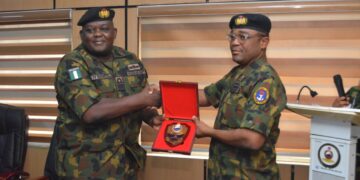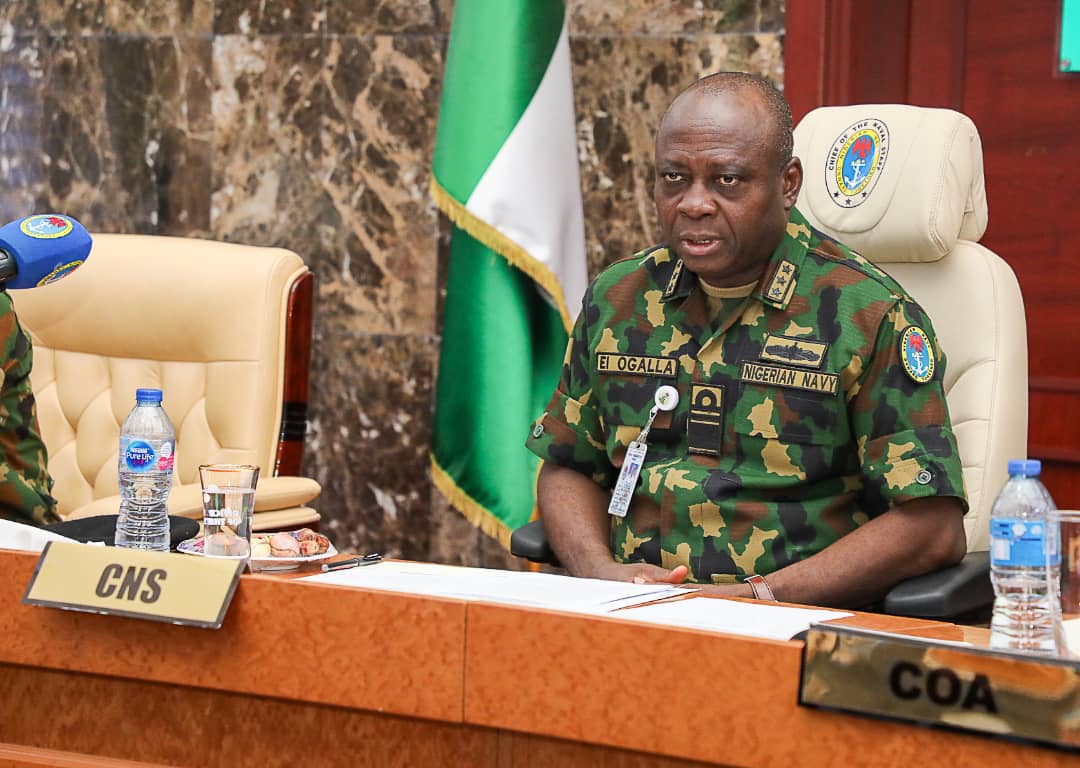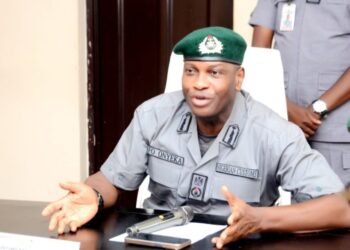On this edition of the programme ‘At The Marina Today’, Captain Emmanuel Iheanacho, the CEO, Genesis Worldwide Shipping Company, shares insights on building not just new ports, but one that would have the capacity for requisite trade performance including being able to receive modern ships. Iheanacho also expresses concerns about the present ship acquisition financing model of the Cabotage Vessels Financing Fund (CVFF). He believes that a review and an expansion of the scope would do the nation’s economy great good by enabling indigenous players to participate in shipping trade both locally and internationally. He also shares his thoughts on other issues of interest in the sub-sector.
See the transcription below.
What interests you the most about maritime industry development in Nigeria at this time?
I am interested in a proposal that the government has already made, where we were told that the government has set aside one billion dollars to be spent on upgrading port facilities nationwide.
I don’t know what the breakdown of that upgrading entails, but I expect that if you are spending one billion dollars, it might involve the requirement to build one new port and spend money on old facilities that are there. The port that serves our trade must be able to play host to the newly developing and evolving ship types- the size of the vessel, the depth of the vessel; all of these have to be taken into account.
Considering the need for port development, which of the agencies should effectively handle specialised areas for the country to achieve this development?
It is entirely up to the ministry. When we are taking about ports and shipping, we are talking about, under the current dispensation; it is the Marine and Blue Economy (the old Ministry of Transport). They should be able to put together a Faculty of Experts who would carry out a study and look at the trends in the industry in terms of the ship types that would be calling at our ports, in terms of the port facilities that would play host to those ship types, look at the possibility also that we would move away from discussing endlessly the need for us to establish proper shipping capacity, because, it is a dynamic process. Whilst we are talking about it, developments are ongoing and evolution is happening. So, we must be a part of that conversation.
So, there is a need for us to look at the results of a study, which shows us what we are going to benefit from such investments in the future.
The shipping industry has absolutely stagnated for a very long time. You can hardly find any substantially new additions to tonnage. Where are they? So, we have to make a move.
What about concerns on the inland waterways transportation?
I don’t know why you are picking on the inland waterways particularly. We will talk about all our shipping connections – international trade connection, coastal shipping, regional shipping and then maybe inland waterways. All these are components of economic artery that if properly harnessed would help our economy grow.
An investor in inland waterways transportation actually called for a reactivation of the service from CMS Jetty in Lagos to Tema in Ghana
I never heard of that and I am a bit surprised if that is the case, because I am quite familiar with the structures that they have on the ground. Yes, it would be nice if you had a proper service serving the trade between the two countries. I never knew about it. The only service I knew about was the Kathleen Service, a service that ferried people and goods across from Apapa side to Lagos Island side and vice versa.
The Africa Continental Free Trade Area (AfCFTA) conversation actually stimulated the mention of the CMS-Tema inland waterways transport service
It would be nice. It would actually ginger trade between the two countries. There are some things that Nigerians do that Ghana would like and vice versa. But the problem that would stop that trade from developing would be the lack of effective transport connections that would move the goods back and forth. And it is the easiest thing to do because the ships needed would not be big ships at all; if they were big they would be 5000 tons, if they were very big they would be 10,000 tons. And if they were up to 10,000 tons, then you might be minded to expand the range of travel of those vessels, so that you are not giving a service that goes from Lagos to Ghana and Ghana back. Maybe from Lagos to Ghana, to Liberia, to Freetown, and if you want to, you could go up to Banjul, the capital of The Gambia. Then you come back again and pass to Cameroons and if you want, through to Gabon.
I remember that Alh. Bamanga Tukur’s company did propose to establish such a service. But somehow, it didn’t catch on. But it was supposed to be a small feeder service that really travels all along the coast feeding cargos and taking on and dropping them. That is the real Cabortage and going back and forth.
At that discussion, stakeholders thought that some level of government support would make a difference. How do you see this?
There has to be government support because it is not an existing trade route; so you really have to make a lot of sacrifices in the beginning to allow for the trade to become established. That is market making and somebody has to bear that cost. So, if the government realises what would be achieved at the end of the exercise then they would actually support it for that period and back it up with advertising and publicity, so that people would now know that you don’t always have to send goods to Europe, there could be people down in Africa who could need these things. They would then utilise the shipping connections to facilitate it.
Who should be at the core of these engagements?
ECOWAS is there, AU is there, ECOWAS can do it within the region. But look at what is going on in ECOWAS now; there is a lot of mistrust between the members of ECOWAS because of recent political upheavals in some of the countries. So, some people might not be interested in working with their erstwhile neighbours and friends. The same thing goes for AU, so there has to be a central organisation or sovereign that really would stay there and say this is what we are looking for in the long term, so everybody plays your part because this is how it would go.
Can the WTO come in to play that important role?
Of course, it can. That is what it is there fir, to promote trade between countries in the world, regulate issues that might arise in the trade between countries. Yes, the WTO is a very good vehicle to push this idea.
Still on shipping development, lately, there are yet visible development in the Shipping sub-sector. Kindly share your thoughts on this.
That is true. One of the biggest problems is that people who run the industry are not necessarily familiar with the potentials for shipping. Of course we understand that political considerations will always bear on how people are appointed and where they go to. But also, we think that pragmatic considerations ought to be given adequate weighting, so that people who really have strategic ideas about how to develop the industry, the sort of vessels that you have, the nature of the service that has to be given. Those people also, if they don’t come at the top echelon of leadership in the industry, they come close to the top, so that there is inter- fertilization between politics and industry.
So, if you we have a situation where the industry was too heavy with people who are not maritime or transport professionals, then you will have these issues because one year passes, another year passes. So, you didn’t have a ship 10 years ago, you didn’t have a ship five years ago, you don’t have a ship now and you are going into the future. Every day we have conferences where we look at the issue of development that happen elsewhere – developments in terms of ship types, in terms of movement away from manned vessels to autonomous vessels, in terms of developments that impact on how productive that ships are, how those vessels actually going to port, where through the use of automation you are actually harvesting greater profits from the throughput of cargoes that transit the ports. So we really need to have people who understand that there is the need for us to catch up – not to catch up in having conferences and such like, catch up in terms of developing proper fleet. The last time that Nigeria tried to develop a proper fleet was in the late 1970s – long time ago, in the days when we sailed on ships that were bought. I don’t want to go into the long story of the rationale that led to buying those ships at that time. But anyway, what happened was that a decision was taken and a fleet of ships wad bought and technically operated by Nigerians who were trained to be able to operate them. If we had actually made a sustained effort, we would ha e moved up from there. As the ships are evolving we would be buying those ships and we would be training Nigerians who would be owning those businesses, because it is not just the ships, it is understanding the markets within which those ships operate, so that you don’t come there and you are doing something that is different from everybody else; you really try and fit in and are able to compete and then in so doing you are able to create value locally.
What would be top interest for discussion and action for you as a stakeholder in the shipping subsector?
Financing is there. It is absolutely key, because ships are highly capital intensive and so, nobody wants to lose money. People want to have a reasonable guarantee that any money they invest in lending money to people to buy ships is not money that would be treated as if “it’s my turn” or it’s my share. So, these are the major considerations. But we really need ships, because Nigeria is basically an international trading nation selling oil and deriving a lot of revenue from selling that oil and spending that money in buying semi-manufactures and things like that. But both in the import and export legs, those goods are carried by ships, and the huge amount of money in our international trade is domiciled in freight payments that others receive and we don’t receive. For us, it is an out payment.
Considering the core of shipping; what it does and the needs it has in ship repairs and maintenance, how would you describe Nigeria’s position?
It is a multiplier benefit. Shipping doesn’t exist for shipping sake. Shipping generates multipliers in terms of the resources you need to run a ship. You need bunkers to run a ship, you need to repair the vessel, and they need to go to dry dock. All of these place a call within the economy. If you have ships that are operating then you have to have shipyards where those ships would be dry- docked. And from having shipyards where the ships would be dry-docked you are not far from having shipyards where the ships can be built locally. If those ships are built locally, there is a demand for steel. So, it links him with the steel industry, so you produce high volume of steel plates and sheets of all kinds for building those ships. So, when we have a steel industry that is not linked to ship building, sometimes you wonder; at the end of the day what are they going to do with the output of that industry? In any case, we are talking about initiatives that started and stopped and never continued.
How are the ship maintenance yards doing in Nigeria?
The ship repairs and maintenance facilities that we had have absolutely gone under. We used to have the Continental shipyard which is affiliated to the Nigerian Ports Authority and they did the dry dock of certain sizes of vessels, not very big ships; maybe to the size of about 10,000 tons. It was a floating dock that they were using. Then of course there was Niger Dock; it was managed in such a way that it was sold away from government. It is a real strategic industry and maybe the idea really should have been to have a government presence in it or to have had a mixture of Public Private Partnership (PPP), so that the strategic imperatives for having a ship repair facility is not lost.
Do you suggest they revisit the idea of a PPP in the ship maintenance operations?
They could revisit it. That is a position. But that really would involve them actually buying the facility back from the people who own it currently; because these people are the legal owners and you couldn’t go there, unless you nationalize their business, in which case you will have to pay them compensation. But I think it is very important that we have a facility like Niger Dock where we can repair our vessels and next door to it, I remember attending a function in those premises where they said a shipyard would be built for building ships. But that never materialised.
What about the CVFF?
I don’t know why we have such a controversy concerning the Cabotage Vessel Financing Fund (CVFF). The CVFF was accrued for a particular reason. It was accrued to help indigenous operators scale the hurdle of finding finance for buying ships.
What I would do if you asked me “Would I make any modifications to the CVFF?” I would actually not constrain it to Caboatge vessels alone. I would make it a fund that people can borrow for developing shipping capacity – whether it is for international shipping in international trade or shipping in coastal trade. That is what I would do. But certainly, there is a need to get people with financing skills, who would work out the modalities for lending this money, because in the final analysis, it is a dedicated fund, but it should not be one that must be wasted. It has to be loaned to people according to specific criteria for ensuring that people articulate a plan that is workable, so that they don’t borrow the money and tomorrow they are parked out there and there are no jobs for them. All of these have to come into the decision mix, so that we spend the $700 million in a very sensible way.
We need to be able to have international trading capacity, invest in container vessels, and invest in tanker vessels. We need to have a committee that would look at the structure of Nigeria’s international trade, which would reflect the structure of the fleet to serve that trade. So, how many tankers do we have calling in our ports, where and where do they sail from and how many of them do we want to replace? How many general cargo vessels do we have, how many container vessels we have; so that we have representation in all of the different trade sectors.
































































